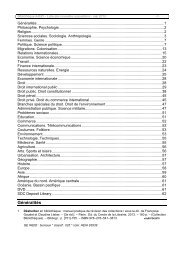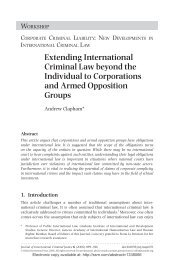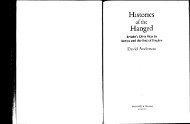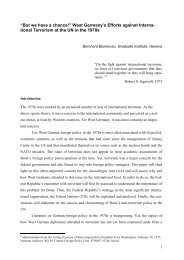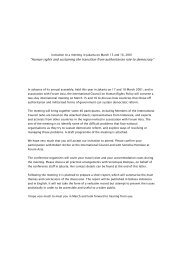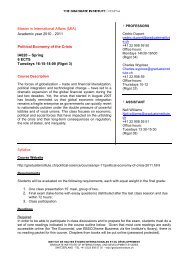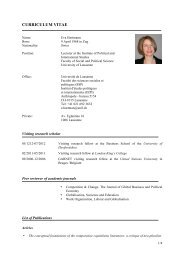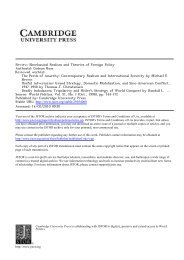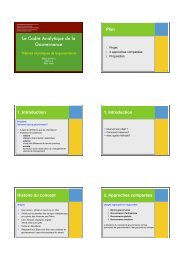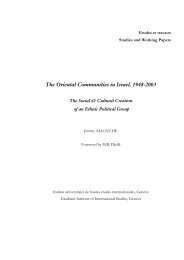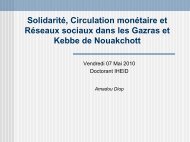Download [pdf] - The Graduate Institute, Geneva
Download [pdf] - The Graduate Institute, Geneva
Download [pdf] - The Graduate Institute, Geneva
Create successful ePaper yourself
Turn your PDF publications into a flip-book with our unique Google optimized e-Paper software.
PAKISTAN, Karachi: This picture taken on 7 February 2012 shows a Pakistani employee working at a textile factory in Karachi. <strong>The</strong> European Union is Pakistan’s largest<br />
trading partner, receiving nearly 30 percent of its exports – worth almost 3 billion euros (USD 3.9 billion). AFP/Asif HASSAN.<br />
make law and justify its legitimacy.<br />
No questions are asked about how<br />
representative these state actors are,<br />
how workable or coherent the proposed<br />
solution is or whether domestic<br />
parliaments had effective oversight.<br />
Contrast this to the way most informal<br />
international lawmaking occurs. Here,<br />
a set of best practices are emerging<br />
which amount to what one could call<br />
“thick stakeholder consensus”. In other<br />
words, guidelines, standards or other<br />
restrictions on freedom only occur<br />
when they emanate from a recognised<br />
authority or rule-maker (e.g. based on<br />
representativeness, expertise or a history<br />
of effective coordination), are supported<br />
by all relevant stakeholders<br />
(not just central state representatives),<br />
are based on consensus (with no veto<br />
for individual actors) and were developed<br />
through open, inclusive and<br />
transparent procedures which<br />
continuously test and adjust the relevant<br />
standard to evolving realities<br />
and demands. Not all informal international<br />
law meets this benchmark,<br />
but an increasing amount of it does;<br />
where it does not, adjustment to align<br />
to best practices is much easier than<br />
reforming the WTO or UN. In this<br />
sense, informal international lawmaking<br />
can be more effective, legitimate<br />
and accountable.<br />
In a recent WTO dispute, the Appellate<br />
Body imposed something akin to “thick<br />
stakeholder consensus” before the<br />
WTO would accept an outside standard<br />
as an “international standard” that<br />
WTO members must use as a basis for<br />
their domestic technical regulations<br />
pursuant to the Agreement on Technical<br />
Barriers to Trade. This is a welcome<br />
development that should exercise quality<br />
control over an important part of<br />
informal international lawmaking. This<br />
begs the obvious question of whether<br />
formal international law should be held<br />
against the benchmark of “thick stakeholder<br />
consensus”. For one thing, the<br />
WTO is not an “open” organisation as<br />
it requires consent of all existing WTO<br />
members before a new member can<br />
join. More importantly, one could question<br />
whether today rule-development<br />
in the WTO sufficiently involves all<br />
stakeholders and meets standards of<br />
transparency, coherence and<br />
adaptability.<br />
Informal international lawmaking is on<br />
the rise. It represents a complementary<br />
model to the existing formal WTO structure.<br />
<strong>The</strong>se new methods of governance<br />
are not always second-best to a<br />
formal treaty. Increasingly, they are<br />
the best way forward both in terms of<br />
effectiveness and accountability. •<br />
LA REVUE DE L’INSTITUT I THE GRADUATE INSTITUTE REVIEW I GLOBE I N11 Printemps I Spring 2013<br />
15


![Download [pdf] - The Graduate Institute, Geneva](https://img.yumpu.com/23370020/16/500x640/download-pdf-the-graduate-institute-geneva.jpg)
